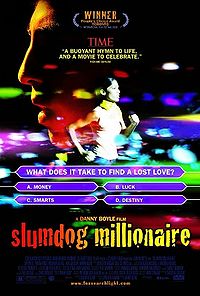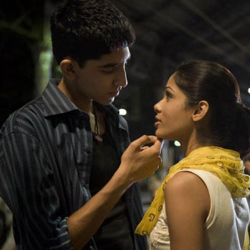
After a mishap or two, I went to see Slumdog Millionaire this past weekend. Based on the book Q and A by Vikas Swarup , the movie centers around the story of a ‘slumdog’ in Mumbai who wins the Indian version of ‘Who Wants to be a Millionaire’. The movie was nothing like I expected!
I try to stay up-to-date on movies and various pop culture, but if there is a movie I’m potentially interested in seeing, I do everything I can to avoid previews and reviews of the movie. Obviously this doesn’t always work out so well, especially with certain movies that garner a lot of buzz: I am powerless if the preview is played every other commercial on TV! (Doubt would be one example: I saw the play on Broadway, and loved it, so in this case, I at least already know the story line).
Anyways, here is what I knew or thought I knew about ‘Slumdog Millionaire’ before seeing it:
The movie was set in Mumbai and had something to do with a ‘slumdog’ (someone who lives in the slums of India) beating odds to win ‘Who Wants to be a Millionaire’.

So, I already knew that the main character, Jamil, had won, so my hunch was that the story wasn’t about whether he won or not. I thought the movie was going to be structured fairly linearly and chronicle his life up to winning and how his life changed after winning. It sounded like a basic, but heart-warming concept.
The actual movie ultimately was heart-warming, but it was more layered and nuanced than I had predicted. The movie starts in the near-past with Jamil already on Who Wants to be a Millionaire, very close to winning. It then cuts to a scene of Jamil being tortured under the assumption that he must have cheated to win. It then goes back to Who Wants to be a Millionaire. It then goes to the present, with Jamil sitting with the chief investigator, watching the show and explaining and justifying his answers to the chief.
This is where the movie becomes especially effective and touching. In order for the audience to understand Jamil and how it was possible for him to win, we go back to different scenes in his life (shown in chronological order): each scene shown has had an important impact on Jamil and left a lasting memory with him. These memories help with the questions (be it: Who is on the $100 dollar bill or the singer of a certain song.). Many times the audience is unaware how the back story connects with the Millionaire question until the end of the story. The movie progresses along in this manner, cutting between Millionaire questions and clips from his life.
Jamil was the reason this movie was so touching to watch: his total goodness and honesty in the face of often horrible, unimaginable circumstances:he believes in telling the truth, the goodness of his brother (despite evidence to the contrary) and most importantly to his survival, in true love. His contact with his ‘true love’ was brief throughout his life, yet he was certain about it. His reason for going on Millionaire was not win money and fame, but for the hope that Latika would see him and find her way to him. That entire concept is so touching and unfamiliar in a movie where betrayal and violence reign supreme.It seems like Jamil’s entire life was spent running and hiding and cowering and begging. His motives were still so pure and true and in the end, he did find happiness,
despite being from the slums, despite being beaten down, orphaned, penniless.

I left the movie feeling pensive about my own annoyance with the little things that our lives can throw at us. I feel more resolved to be thankful for the things in my life that do matter. With my slightly cynical streak, it takes a well done movie to leave this message with me and not have it feel corny or clichéd. Slumdog Millionaire succeeded.